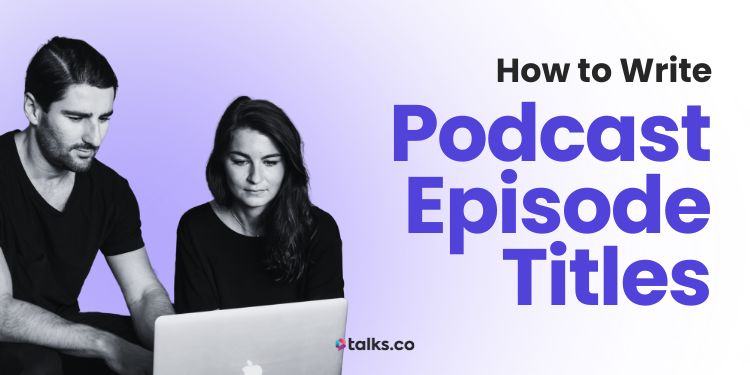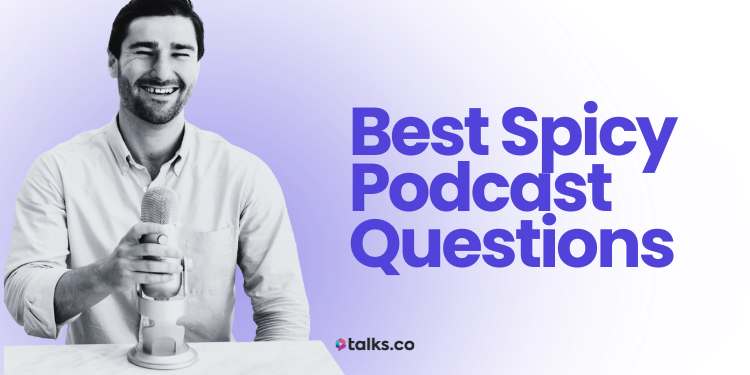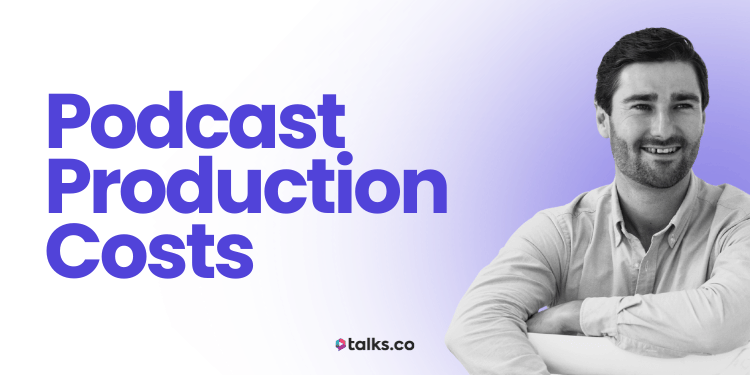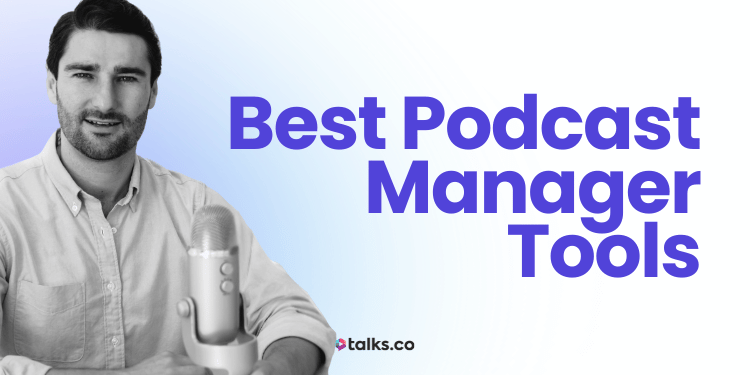You’ve put in the work planning your podcast, recording episodes, maybe even publishing a few. But when you look at the stats, the downloads aren’t where you’d hoped.
You’re left wondering: Is it my content… or is it the titles?
After recording and appearing on hundreds of shows, I’ve seen firsthand how much weight a title carries.
A strong title entices and pulls in potential listeners for years. A weak one gets ignored, no matter how good the content is.
In this guide, I’ll show you how to write podcast episode titles that grab attention, show up on search engines, and get people to hit play. You’ll see best practices, examples from real podcasters, tools, and a few mistakes I’ve learned the hard way.
By the time you finish, you’ll know how to create podcast episode titles that not only sound good but also put your podcast in front of the right people for your show.
What Are Podcast Episode Names?

Podcast episode titles are more than labels. They’re signals. Every time someone scrolls through Apple Podcasts, Spotify, or Google, your title is silently answering three questions:
- Who is this episode for?
- What will I get from it?
- Why should I care right now?
A strong episode name positions you as the authority. A weak one leaves listeners guessing or scrolling past.
What makes a title work:
- Direct and decisive: “7 Ways to Get High-Ticket Coaching Clients in 30 Days” tells the listener exactly what to expect.
- Compact, not cramped: Keep titles readable. Scannable at a glance means under 60 characters is ideal for most platforms.
- Actionable phrasing: Use verbs and concrete outcomes, not vague filler.
- Curiosity with honesty: Tease the payoff, but don’t mislead. Example: “The Biggest Mistake Coaches Make With Leads” hints at a solution.
- Tone alignment: Casual, cheeky, or professional. Stick to your brand voice.
These elements make a title functional, memorable, and strategic. It’s not just about clicks. It’s about guiding the right listener to your content consistently.
Why is a good podcast title crucial?
A strong title can make your content impossible to ignore, while a weak one can leave even the best episode unnoticed. Here’s why it matters:
- Grabs attention: Someone scrolling Spotify might stop for “5 Marketing Mistakes That Are Costing You Clients” but skip “Episode 12: Marketing Tips.”
- Builds consistency: A recurring format like “How to…” or “Top 5…” helps listeners know what they’re getting.
- Encourages clicks: Titles that promise solutions, like “How I Grew My Podcast From 0 to 10,000 Downloads in 3 Months”, pull listeners in.
- Facilitates sharing: Catchy, memorable titles get shared more, like “The Biggest Mistake Coaches Make With Leads.”
- Enhances engagement: The right title draws the target audience that will actually stick around and listen.
- Differentiates your show: Unique titles stand out in a crowded market, e.g., “Stop Multitasking: The Productivity Myth That’s Killing Your Week.”
- Drives growth: Every strong title helps increase listens, attract subscribers, and grow your podcast as a business tool.
- Signals relevance to current events or trends: A title like “Social Media Updates You Need to Know in 2025” shows the episode is timely and topical.
- Highlights expertise or credibility: Titles such as “Lessons from 20 Years as a Health Coach” communicate authority and trust.
- Hints at story or transformation: Titles like “From $0 to $100K: How I Built My Coaching Business in One Year” give listeners a clear sense of the journey they’ll hear about.
5 Best podcast episode names
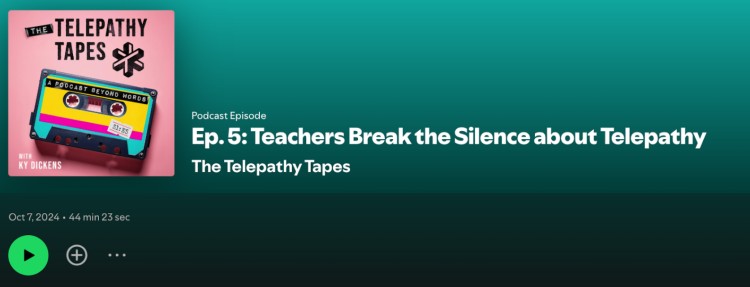
Every title is a sales pitch for your listener’s attention. Mix short, punchy hooks with longer, outcome-driven titles to balance variety and impact.
- Ep. 5: Teachers Break the Silence about Telepathy (The Telepathy Tapes). Punchy, specific, and impossible not to click.
- Focus on What’s Right About Young Men with Barack Obama (IMO with Michelle Obama and Craig Robinson). Clear message, big-name guest. That combo sells itself.
- We’re Gonna Dance (w/ Lady Gaga) (Las Culturistas). Fun, direct, and the Gaga factor does the heavy lifting.
- Adolescence is One of this Decade’s Most Important Shows (ReelTok Podcast). Urgent and opinionated. You know exactly what they stand for.
- E558 Katt Williams (This Past Weekend w/ Theo Von). Stripped down to just the name. Confident move, but it works when the guest is a heavyweight.
How to Title Podcast Episodes
A solid episode title isn’t just a creative touch. It’s a system.
You don’t need to guess the titles for your podcast. What you need is a repeatable process that helps you write podcast episode titles faster every time.
Follow these steps when titling your episodes:
- Lead with the takeaway: What’s the one result the listener will get? Build your title around it. That’s a huge part of what makes a good podcast.
- Trim the fat: Less is more. Keep it readable, ideally under 60 characters.
- Use power verbs and numbers: Words like “Proven,” “Secrets,” or “7 Steps” create clarity and punch.
- Think search intent: What exact phrase would your target audience type? Sprinkle in those SEO keywords naturally.
- Draft multiple options: Write five versions, then pick the strongest title and description.
- Read aloud: Titles should sound like a headline, not a filler line.
- Stay on brand: Match your tone consistently, e.g., cheeky, professional, or casual.
- Avoid deception: Curiosity works; clickbait kills trust.
- Scout competitors: Check what works in your niche. Model patterns, don’t copy.
How to name a podcast episode
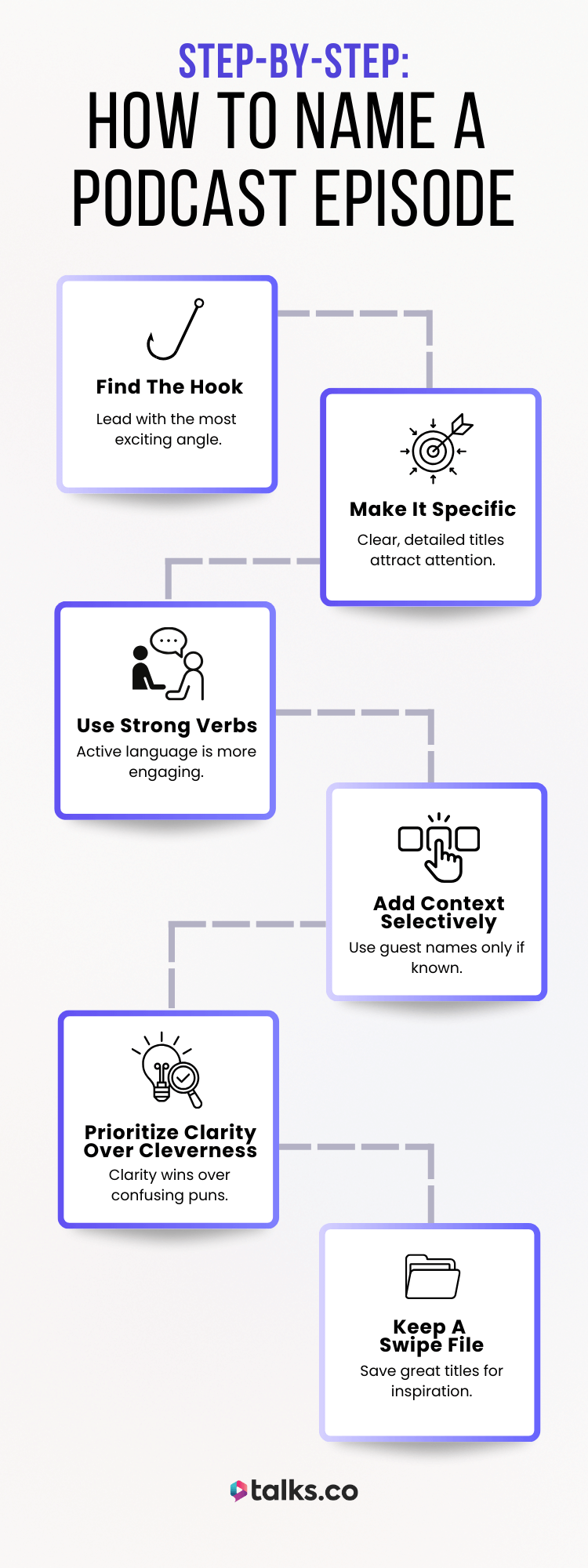
Think headlines, not labels. Avoid “Episode 34: Marketing Chat.” Make each name sell a result, a story, or a transformation:
- Find the hook: What’s the juiciest angle in the conversation or lesson? Lead with that.
- Make it specific: Vague titles like “Business Tips” don’t work. “5 Business Tips That Double Revenue” does.
- Use strong verbs: Active language beats passive every time.
- Add context selectively: Guest names matter only if the audience recognizes them; otherwise, focus on their unique takeaway.
- Prioritize clarity over cleverness: A clever pun might amuse you, but if it confuses listeners, you’ve lost them.
- Keep a swipe file: Save strong titles from other types of podcasts you admire. Use them for inspiration when naming your own.
Best titles for podcasts
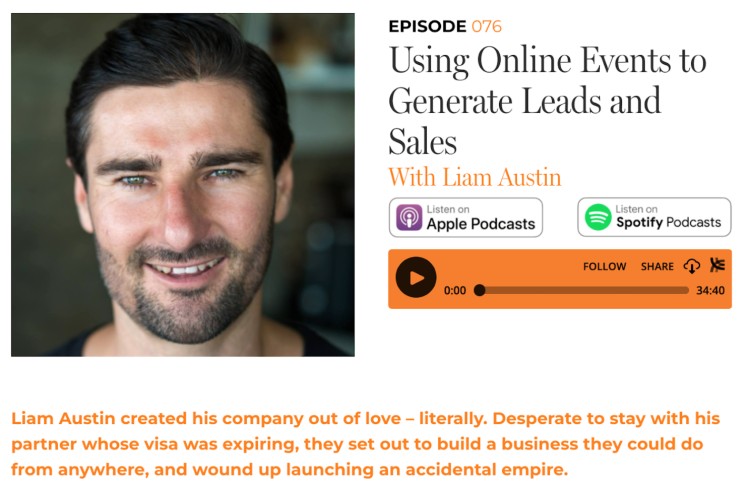
To make things even easier, here are customizable, fill-in-the-blank podcast title ideas. Plug in your good podcast topics or niche, and you’ve got titles ready to go.
Business and entrepreneurship:
- How I [Achieved Result] in [Timeframe] Without [Pain Point]
- [Number] Mistakes That Are Costing You [Outcome]
- The Exact System I Use to [Do X]
- [Number] Proven Strategies to [Goal]
- From [Starting Point] to [End Result]: My [Journey/Playbook]
Health and fitness:
- The [Number] Workouts That Actually [Deliver Specific Result]
- How to [Achieve Goal] Without [Common Obstacle]
- The Truth About [Popular Trend] and Why It Works (or Doesn’t)
- [Number] Nutrition Hacks That [Result in X]
- From [Struggle] to [Success]: My [Fitness/Health Story]
Coaching and personal development:
- How to [Break Through Limiting Belief/Obstacle]
- [Number] Lessons I Learned From [Specific Experience]
- The Biggest Mistake [Audience Type] Make With [Topic]
- From [Low Point] to [High Point]: What Changed Everything
- [Number] Habits That Shifted My [Life/Business/Mindset]
Marketing and content creation:
- How I Grew [Platform/Metric] From [X to Y] in [Timeframe]
- [Number] Content Ideas That Actually Convert
- The [Strategy/Tool] I Use to [Achieve Marketing Goal]
- [Number] Social Media Mistakes That Kill Engagement
- Behind the Scenes: How I Planned [Campaign/Launch]
Lifestyle and relationships:
- [Number] Lessons About [Topic] I Wish I Knew Sooner
- The Real Reason [Common Struggle] Happens (and How to Fix It)
- How to [Improve Relationship/Quality of Life] Without [Big Obstacle]
- [Number] Daily Habits That Changed My [Life/Marriage/Career]
- From [Challenge] to [Breakthrough]: My [Personal Story]
How to Write Good Podcast Episode Titles
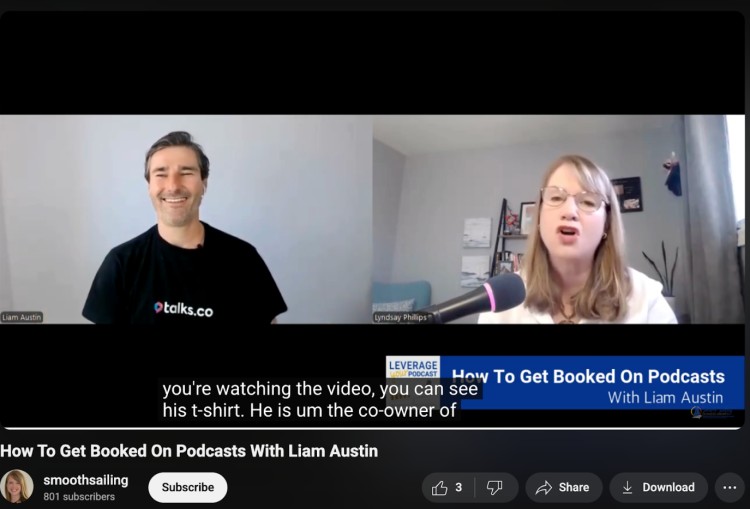
Writing a strong podcast episode title is a skill. They communicate value, frame your story, and establish authority before a single word is spoken.
Here’s how to do it right:
- Think in story beats: Instead of “Interview with Sarah Baker,” highlight the arc. For example: “From Burnout to Bestseller: Sarah Baker on Writing That Sells.” This frames your episode as a story listeners can step into.
- Balance curiosity with payoff: A hook only works if the listener feels rewarded. “How To Get Booked On Podcasts With Liam Austin” makes it clear what listeners will gain.
- Front-load the unique angle: Don’t bury the lead. If your guest shares an unusual method, highlight it first. Example: “The 10-Minute Networking Trick No One Talks About.”
- Mirror the way people talk: Keep it conversational. Titles like “Liam Austin | 7 Questions In 7 Minutes” feel approachable and human, not stiff.
- Create series consistency: Recurring patterns like “Top X” or “How to…” help listeners know what to expect. Example: “How to Book More Podcast Appearances and Build Authority”.
- Leverage contrast: Juxtaposition catches attention, e.g., “The Worst Marketing Advice That Actually Works.” Playing with opposites makes people stop scrolling.
- Make guests the “bonus,” not the headline: Lead with the takeaway. Drop the guest at the end if necessary. “600 Million Listeners Are Waiting | Podcast Guesting with Liam Austin” puts the result first, guest second.
How long should my podcast episode titles be?
The right title length helps your episodes land, get found, and feel approachable.
Too short and listeners might not understand what’s inside. Too long and it’s chopped off in Spotify, Apple Podcasts, or Google.
Here’s a simple guide with examples:
- Short (under 40 characters): Quick, memorable, scroll-friendly. Think snappy hooks like “E558 Katt Williams” or “Top 3 Lead Gen Hacks.”
- Medium (40-60 characters): Gives context and clarity without clutter. Examples: “Book Your Calendar Full of Dates with this Hot Podcast Matchmaker” or “Episode 349: Virtual Event Conversions with Liam Austin.”
- Long (60-80+ characters): Perfect for storytelling or detailed takeaways. Examples: “How to Power Prospect with LinkedIn Groups with Liam Austin #135” or “How to Create a Predictable Education Empire Income Machine with Liam Austin.”
Talks tips for picking your length:
- Put the main result or insight first.
- Consider where it will appear (e.g., search results vs. app previews).
- Longer titles are okay if the extra detail genuinely hooks and informs the listener.
Talks Podcast Episode Titles Generator
Coming up with strong podcast episode titles can feel like a grind. The Talks Podcast Titles Generator makes it simple. Plug in your topics, and it spits out scroll-stopping title ideas you can use immediately.
How to use it:
- Enter the main topics of your episode. Think outcomes, results, or the biggest takeaways.
- Let the generator create several options tailored to your topic.
- Pick the one that hits hard, tweak if needed, and drop it into your episode notes.
Why it works:
- Cuts down brainstorming time.
- Gives titles that are clear, punchy, and clickable.
- Lets you test different angles before recording.
- Helps you stand out in crowded feeds.
- Keeps your episodes consistent and professional.
Podcast episode titles examples
To get a feel for how the generator works, try this prompt:
“How to grow an online coaching business, attract high-ticket clients, and host virtual events that convert”
Here’s what you get fresh from the generator:
- Mastering the Art of Online Coaching: Secrets to Attract High-Ticket Clients
- Virtual Events Unleashed: Converting Attendees into Clients for Your Online Coaching Business
- From Zero to Hero: Growing Your Online Coaching Business with High-Ticket Client Magnetism
- The Ultimate Guide to Hosting Virtual Events that Convert for Online Coaches
- Scaling Up: Strategies for Explosive Growth in Your Online Coaching Business
These examples hit the core outcome, are easy to scan, and pull listeners in. They’re ready to use or tweak for your style.
Formatting Questions: Podcast Title Style
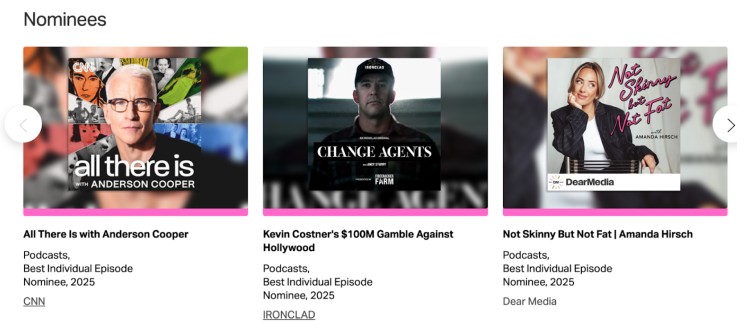
Even the best episodes can look sloppy if your titles are inconsistent or overformatted. How you display them affects how professional your show feels and how easy it is for listeners to scan quickly.
Should podcast episode titles be italicized?
Nope. Episode titles don’t need italics. Use standard font and capitalization that matches your platform’s style. Italics are more for book or movie titles, not your podcast episodes.
Talks tips:
- Stick to one style: title case or sentence case, whatever fits your show.
- Keep it simple. Avoid unnecessary symbols or formatting tricks.
- Be consistent across every episode so your show looks sharp and professional.
Are podcast episode titles italicized?
Still no. Whether in show notes, on your website, or on podcast directories, keep episode titles plain. The key is clarity and consistency, not fancy formatting.
Examples of strong, clean titles:
- “Liam Austin: Million Dollar Virtual Events”
- “E1: Luck, Or Something Like It”
- “This Is Cate Blanchett’s Sexiest Word To Say | Uncut”
For more ways to make your episodes irresistible, check out the Podcast Description Generator and see real podcast description examples.
Titles That Make Competitors Take Notes
Podcast episode titles are your first handshake with your audience.
The right title gives you control: it tells listeners who the episode is for, what they’ll gain, and why they should care all before they even press play.
Stop leaving this to chance.
With a strong title system, you can consistently shape perception, attract ideal listeners, and run your podcast just like the best of the best.
Get your episodes working harder.
Sign up for a free Talks creator profile and manage every title, episode, and guest connection in one place. Take command of your show and make every episode count.
Create your free Talks profile now.
